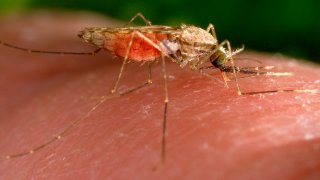
Researchers at UC San Diego have engineered a way to genetically suppress populations of mosquitoes that spread malaria in Africa.
Professor Omar Akbari's laboratory led the research — published Wednesday in the journal Science Advances — which genetically "edits" the mosquitoes that spread the pathogen causing the deadly disease.
"This technology has the potential to be the safe, controllable and scalable solution the world urgently needs to eliminate malaria once and for all," said Akbari, a professor in the Department of Cell and Developmental Biology. "Now we need to transition our efforts to seek social acceptance, regulatory use authorizations and funding opportunities to put this system to its ultimate test of suppressing wild malaria-transmitting mosquito populations.
"We are on the cusp of making a major impact in the world and won't stop until that's achieved," he said.
Get San Diego local news, weather forecasts, sports and lifestyle stories to your inbox. Sign up for NBC San Diego newsletters.
Each year, malaria infections result in hundreds of thousands of deaths, with the majority of fatalities occurring in children under five. The U.S. Centers for Disease Control and Prevention recently announced that five cases of mosquito-borne malaria were detected in the United States, the first reported spread in the country in two decades.
First-author Andrea Smidler, a postdoctoral scholar in the UCSD School of Biological Sciences, along with former master's students and co-first authors James Pai and Reema Apte, created a system called Ifegenia, an acronym for "inherited female elimination by genetically encoded nucleases to interrupt alleles," which uses the CRISPR technology to disrupt a gene that controls sexual development in Anopheles gambiae mosquitoes.
Local
The researchers genetically modified two families of mosquitoes and cross-bred them.
"We crossed them together, and in the offspring, it killed all the female mosquitoes," Smidler said. "It was extraordinary."
According to the researchers, male mosquitoes inherit Ifegenia, but the genetic edit doesn't impact their reproduction. They remain reproductively fit to mate and spread Ifegenia. Parasite spread eventually is halted since females are removed and the population reaches a reproductive dead end, they write.
"Through modeling, we demonstrate that iterative releases of non-biting Ifegenia males can act as an effective, confinable, controllable and safe population suppression and elimination system," the authors note in the paper.
The researchers said this method could help eliminate the increasingly ineffective and polluting use of insecticide.
They also note that the technology behind Ifegenia could be adapted to other species that spread deadly diseases, such as mosquitoes known to transmit dengue, chikungunya and yellow fever viruses.
Scientists at UC Berkeley and the California Institute of Technology contributed to the research effort.



